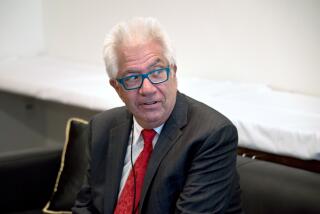‘88 Finishing Touches : Author Discovers He Is in Much Demand
- Share via
Since hitting the intellectual big time early this year, Yale history professor Paul Kennedy has become that rarity--a successful export to Japan.
After his best-selling book, “The Rise and Fall of the Great Powers: Economic Change and Military Conflict from 1500 to 2000,” was translated into Japanese this fall, it became an instant best-seller, Kennedy says, with some surprise.
But then it’s been a year of constant surprise for Kennedy, who was thrust from obscurity by his exhaustive analysis of how nations rise to prominence and why they ultimately decline.
This year, Kennedy received intense attention from high-powered U.S. policy-makers, Congress and pundits because he argued that the United States was in a period of “relative” slippage while countries, such as Japan and China seem to be at the beginning of long world power curves. He further argued that nations that judiciously manage their fiscal resources and military commitments may escape the more traumatic consequences of decline.
It was the kind of stuff lots of people want to know about. For instance, he started the month as the keynote speaker at a conference sponsored by the CIA’s Global Issues division, a branch of American intelligence he didn’t know existed when he was just another history professor.
Kennedy surmises that his forecasting of the implications of current global economic and political trends grabbed Japanese attention because many Japanese are trying to divine the role their country will play in world affairs for at least the next decade.
“They have simply gone crazy on the book,” Kennedy said, adding that the Japanese edition prompted demands for a Korean edition and that an illegal, non-copyrighted edition is circulating in China. In late November and at the start of this month, Kennedy reports that he was besieged by Japanese television stations eager to include him in year-end programs. “The Japanese have been bombarding me day and night, essentially about the future of the world and the future of Japan,” he said.
Kennedy said he has struggled to tell his new audience that he has no special powers of prediction. “You have to keep telling them the future is uncertain and unpredictable,” he said. “. . . A trend can turn and countries can change.”
For Kennedy himself, the trends are pretty clear. He is unlikely to find the “decent obscurity” he expected to overtake him by now. The book is scheduled to come out in paperback soon. The book may become a public television series and he will write the script. Perhaps even more ominous for his shy side--the Soviet Union wants to bring out a Russian editon.
More to Read
Sign up for our Book Club newsletter
Get the latest news, events and more from the Los Angeles Times Book Club, and help us get L.A. reading and talking.
You may occasionally receive promotional content from the Los Angeles Times.










